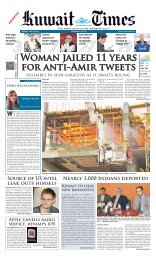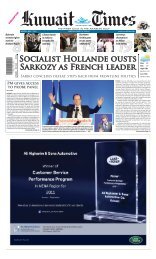ARAb StAtES diSMAyEd At WESt'S cOMPlAcENcy - Kuwait Times
ARAb StAtES diSMAyEd At WESt'S cOMPlAcENcy - Kuwait Times
ARAb StAtES diSMAyEd At WESt'S cOMPlAcENcy - Kuwait Times
You also want an ePaper? Increase the reach of your titles
YUMPU automatically turns print PDFs into web optimized ePapers that Google loves.
SATURDAY, MAY 4, 2013<br />
TECHNOLOGY<br />
Clean technology investors shift focus to drilling<br />
NEW YORK: A decade ago, large investors in so-called<br />
clean technology had a straightforward goal: finance<br />
companies that would help eliminate the world’s<br />
dependence on oil, natural gas and coal. But as profits<br />
from wind, solar, biofuels and other alternatives consistently<br />
fell short of expectations - and as the fossil fuel<br />
business boomed - things got complicated. Venture<br />
capitalists and other investment funds started stretching<br />
the definition of clean technology almost beyond recognition<br />
in an effort to make money while clinging to their<br />
environmental ideals.<br />
Today, clean technology investment funds are not<br />
trying to replace the fossil fuel industry, they’re trying to<br />
help it by financing companies that can make mining<br />
and drilling less dirty. The people running these funds<br />
acknowledge the apparent hypocrisy, but defend a<br />
more liberal definition of clean technology. “Oil and gas<br />
will be with us for a long time. If we can clean that up we<br />
will do the world a great service,” says Wal van Lierop,<br />
CEO of Chrysalix, a Vancouver, Canada-based venture<br />
capital firm founded in 2001.<br />
Chrysalix still backs companies that fit the more traditional<br />
definition of clean energy - including Bridgelux,<br />
which makes more efficient light bulbs, and Agilyx,<br />
which turns plastic waste into fuel. But the firm, whose<br />
website boasts that it is “100 percent focused on clean<br />
energy” is a backer of MineSense, which helps miners<br />
operate more efficiently by assessing the quality of ore<br />
as it is being scooped. It also supports GlassPoint, which<br />
helps drillers extract more oil by using steam generated<br />
with solar power.<br />
Environmentalists have mixed feelings. They welcome<br />
technologies that reduce the environmental footprint<br />
of oil and gas development. But they worry the<br />
newfound abundance of oil and natural gas - and all the<br />
money that can be made helping drillers - has distracted<br />
clean technology backers from what once seemed to be<br />
their main goal: to make oil and gas a thing of the past.<br />
Mark Brownstein, who runs the energy and climate program<br />
at the Environmental Defense Fund, says “some<br />
don’t have the stomach for that and are simply going<br />
with the flow.”<br />
The shift has made even those who are helping to<br />
drive it squirm. “We’ve wrestled with it,” says Alan<br />
Salzman, managing partner of VantagePoint Capital<br />
Partners, one of Silicon Valley’s most prominent venture<br />
firms focused on clean technology. “If someone comes<br />
up with a more benign way of (exploiting fossil fuels), is<br />
that a good thing or a bad thing?” If fossil fuels become<br />
more palatable to society, Salzman says, we may end up<br />
burning more of them.<br />
Ten years ago it seemed as if the world was running<br />
out of oil, and what was left of it was in the Middle East.<br />
Oil and natural gas prices spiked to alarming highs. And<br />
scientists showed that fossil fuels were causing troubling<br />
changes to the climate. Pushing for an end of the<br />
fossil age made sense for economic, political and environmental<br />
reasons. This had Silicon Valley venture capitalists<br />
drooling. “Cleantech” as they called it, would be<br />
the next big thing. And it was going to be very, very big.<br />
These firms saw a chance to profit from what many<br />
thought would be the biggest economic shift in history -<br />
from fossil energy to renewable energy.<br />
But the new energy technologies proved much harder<br />
to master than predicted. And oil and gas drillers,<br />
using technology advances of their own, learned how to<br />
unlock enormous new reserves of fossil fuels. Dozens of<br />
solar, biofuels and battery companies failed, unable to<br />
show enough promise to go public or attract the attention<br />
of bigger companies. “Investors are still waiting for<br />
their cleantech investments to produce returns,” says<br />
Dallas Kachan, who runs the San Francisco clean technology<br />
consulting firm Kachan & Co. “Nobody’s seen the<br />
stellar home runs they were hoping for 5 years ago.”<br />
Even when clean energy companies have gone public,<br />
they haven’t fared well. An index of clean energy<br />
companies is down 69 percent since it began in 2005. A<br />
similar index of traditional energy companies is up 75<br />
percent over the same period. The value of global clean<br />
technology deals fell 29 percent last year to $7 billion,<br />
from a record $9.9 billion in 2011, according to the<br />
Cleantech Group. But the portion of that sum focused<br />
on conventional fossil fuels nearly tripled, to a record<br />
$556 million.<br />
A few clean technology investors have stayed away<br />
from oil and gas despite the temptation. Khosla<br />
Ventures, for example, has been a major backer of<br />
advanced biofuels even as most of these companies<br />
have failed to live up to their promise. The firm does not<br />
invest in companies that support fossil fuels. But the<br />
drilling boom has led to countless investments in this<br />
gray area between clean and dirty. Axine, which is<br />
backed by Chrysalix and Royal Dutch Shell, wants to<br />
make the drilling process known as fracking less dangerous<br />
by treating wastewater produced during drilling<br />
without chemicals.—AP<br />
Mobile ads<br />
lift Facebook<br />
NEW YORK: A year ago, Facebook was just testing the<br />
waters of mobile advertising, causing plenty of headaches<br />
for investors ahead of its massive initial public offering. It<br />
has since eased those worries. On Wednesday the world’s<br />
biggest social networking company said nearly a third of its<br />
advertising revenue came from mobile in the first three<br />
months of the year, helping to push total revenue up 38<br />
percent to surpass Wall Street’s expectations.<br />
“They are making the transition to mobile faster than<br />
anyone anticipated,” said Sterne Agee analyst Arvind Bhatia.<br />
“It seems like they are delivering.” Facebook Inc said<br />
Wednesday that its net income was $219 million, or 9 cents<br />
per share, in the January-March period. That’s up from $205<br />
million, or 9 cents per share, in the same period a year ago,<br />
when it was still private. Revenue grew to $1.46 billion from<br />
$1.06 billion, above analysts’ expectations of $1.44 billion.<br />
Excluding special items, mainly related to stock compensation<br />
expenses, Facebook earned 12 cents per share,<br />
matching the average of analyst expectations, according to<br />
FactSet. Menlo Park, Calif.-based Facebook said that its<br />
mobile advertising revenue was 30 percent of its total ad<br />
revenue in the first quarter, amounting to $375 million.<br />
That’s up from 23 percent, or $306 million, in the fourth<br />
quarter. In the third quarter - the first time it disclosed such<br />
figures - the company generated 14 percent, or $153 million,<br />
of its advertising revenue from mobile.<br />
Investors had been worried about Facebook’s ability to<br />
grow mobile revenue since before its initial public offering<br />
in May 2012. That’s because although the number of people<br />
who access Facebook on smartphones and tablet computers<br />
has been growing quickly, Facebook didn’t begin showing<br />
ads to those users until last year. David Ebersman,<br />
Facebook’s chief financial officer, said most advertisers did<br />
not specify that their ads be shown only on desktop computers<br />
or only on mobile devices, “rather they put their ads<br />
into our system and allow us to show the ads on whatever<br />
device where the ads will perform best.”<br />
Bhatia thinks Facebook will fare even better on mobile<br />
devices once Zuckerberg firms up its plan to make money<br />
from the growing audience checking into Instagram, a photo-sharing<br />
service that the company bought last year for<br />
$521 million. The analyst believes Instagram will play a bigger<br />
role in Facebook’s business next year.—AP<br />
WCup host Brazil promises<br />
fast Internet connections<br />
Fans may use 3G wireless network<br />
BRASILIA: Soccer fans attending next year’s World Cup in Brazil<br />
will have no problem going online from stadiums, but they<br />
might want to use a local cellphone chip to keep their charges<br />
low, Brazilian Communications Minister Paulo Bernardo said on<br />
Thursday. Each of the 12 stadiums hosting the 32-nation soccer<br />
tournament will have two separate 50-gigabyte networks connected<br />
to Brazil’s fiber optic backbone, he told reporters.<br />
“I doubt that the stadiums will use one third of the capacity<br />
that we are installing,” Bernardo said. “Not even Mr Jerome<br />
Valcke will use up all that capacity, though he could if he makes<br />
a lot of explosive statements,” the minister said in reference to<br />
the general secretary of FIFA, the governing body of global soccer.<br />
Valcke was briefly declared persona non grata by the<br />
Brazilian government last year for saying Brazil needed a “kick<br />
up the backside” to speed up preparations for the World Cup.<br />
Though relations between Brazil and Valcke have improved<br />
since, FIFA remains concerned about construction delays for the<br />
stadiums that will host the games. It has also expressed worries<br />
about the readiness of hotel, transport and communications<br />
facilities. Brazil has yet to officially open two of the six stadiums<br />
that will be used for the Confederations Cup, a dress rehearsal<br />
for the 2014 tournament. The smaller contest kicks off on June<br />
15 with Japan facing the host country in the capital, Brasilia.<br />
More than half a million soccer fans are expected to travel to<br />
Brazil next year for the World Cup. Many will be emailing and<br />
posting photos on social networks during the games, congesting<br />
local wireless networks. Brazil officially launched the latest<br />
fourth generation (4G) wireless technology this week, and the<br />
service will be available at the stadiums and in the host cities for<br />
the Confederations Cup. But the majority of foreign fans will not<br />
be able to use it. That is because most smartphones in the<br />
United States and Europe use the 700 MHz frequency, while<br />
Brazil’s 4G network uses 2.5 GHz. “Whoever has a 700 MHz cellphone<br />
will not be able to use 4G, they will have to use 3G,”<br />
Bernardo said.<br />
The minister recommended that fans leave their cellphones<br />
at home to avoid paying “scorching” international roaming fees,<br />
and instead get a local chip on arrival in Brazil. Brazil’s wireless<br />
infrastructure is among FIFA’s top concerns ahead of the World<br />
Cup. FIFA spokesman Walter de Gregorio said last month Brazil<br />
BRASILIA: Brazilian Minister of Communications, Paulo<br />
Bernardo offers an interview to the Foreign Correspondents<br />
Association at the Ministry in Brasilia. Bernardo talked about<br />
the advances of the telecommunications in the country and<br />
the preparations ahead of FIFA’s Confederations Cup in 2013<br />
and World Cup in 2014. — AFP<br />
should maybe fix its 3G network before jumping to 4G. The<br />
number of 3G users in Brazil has grown “explosively” to 70 million<br />
since the technology was introduced in 2008, and is expected<br />
to grow to 130 million by the end of 2014, Bernardo said.<br />
Brazilians complain the service provided by local cellphone<br />
companies is poor, with connections dropping regularly and<br />
signals congesting at crowded events such as music festivals.<br />
Paying for access to Wi-Fi may be the best means of communications<br />
at the World Cup for those wanting to capture the<br />
excitement of the games and post it on social networks.<br />
Ample high-speed Wi-Fi access will be good news for the<br />
heaviest users of broadband at any major sporting event: the<br />
media, who rely on the Internet to send out pictures and video<br />
images. — Reuters
















